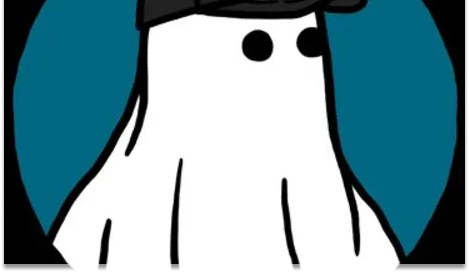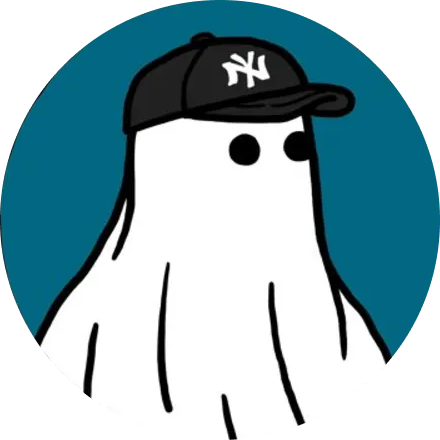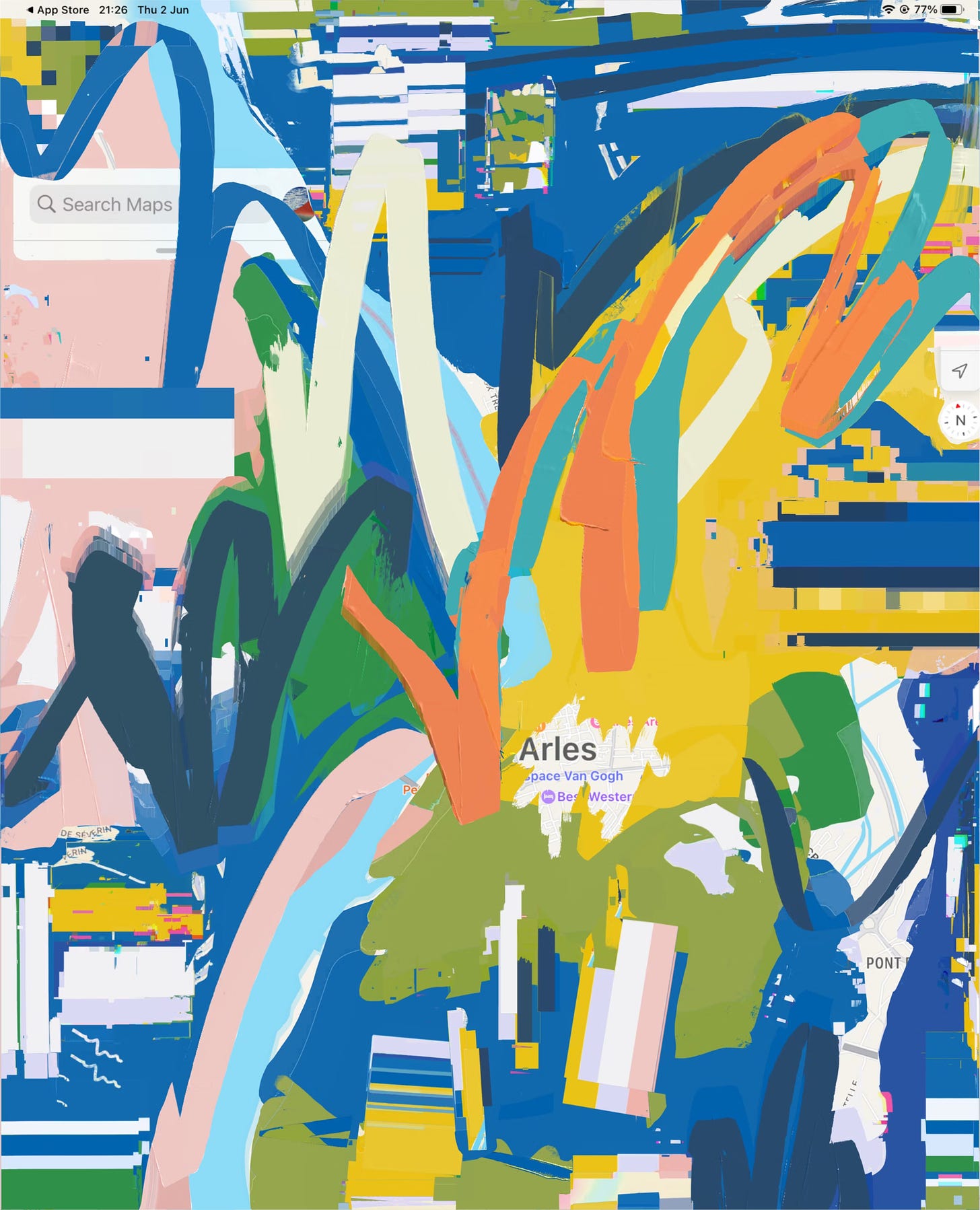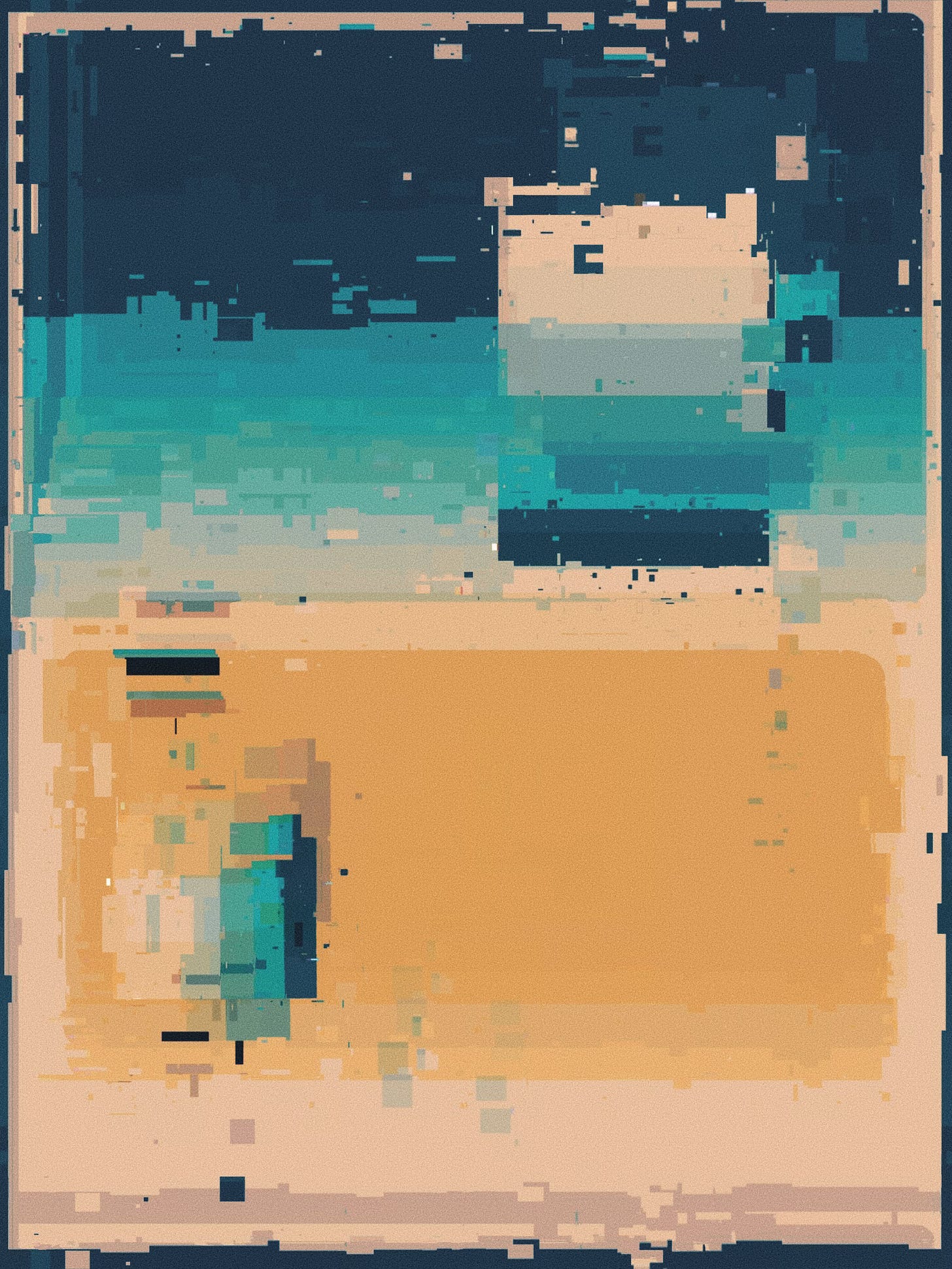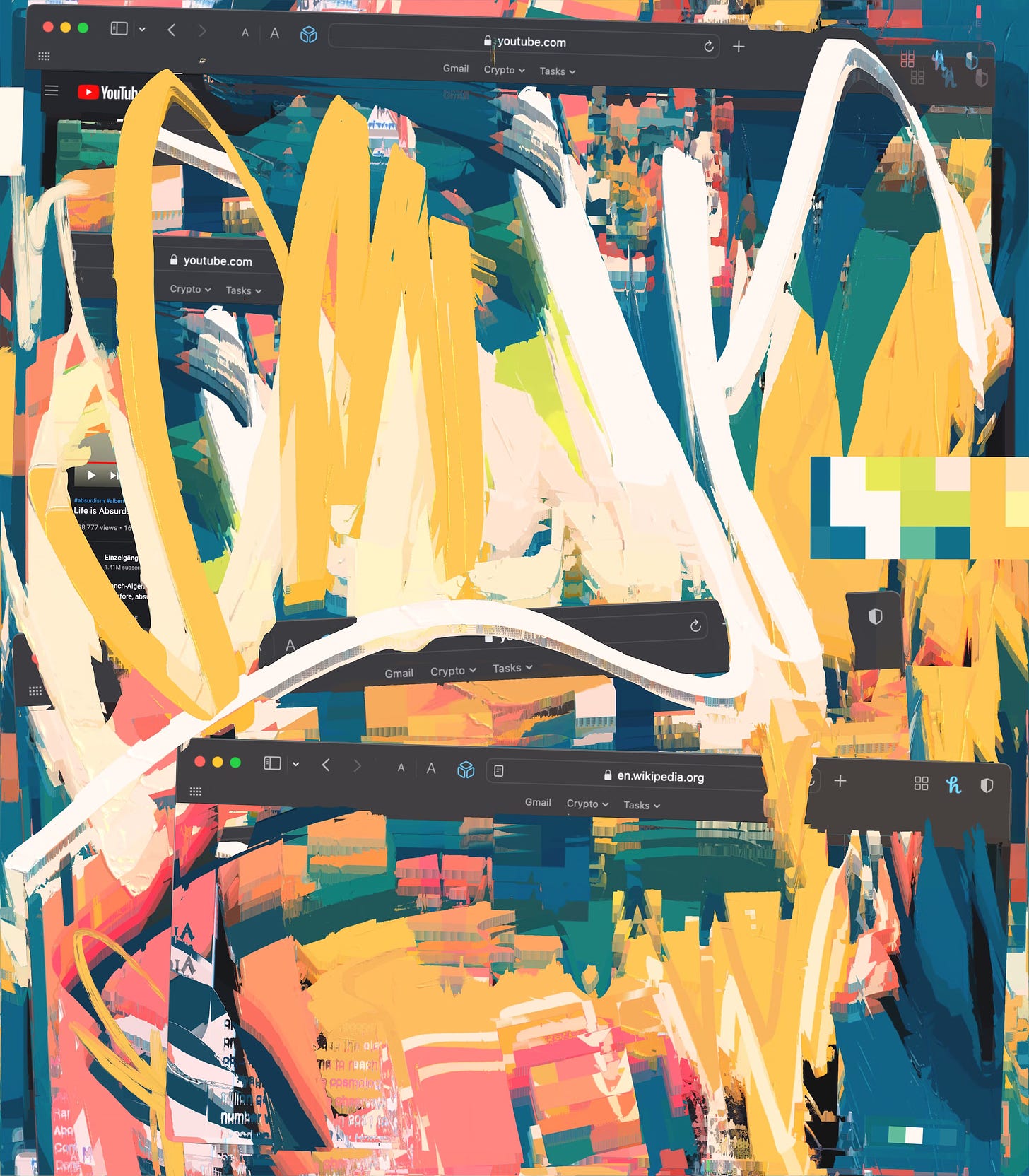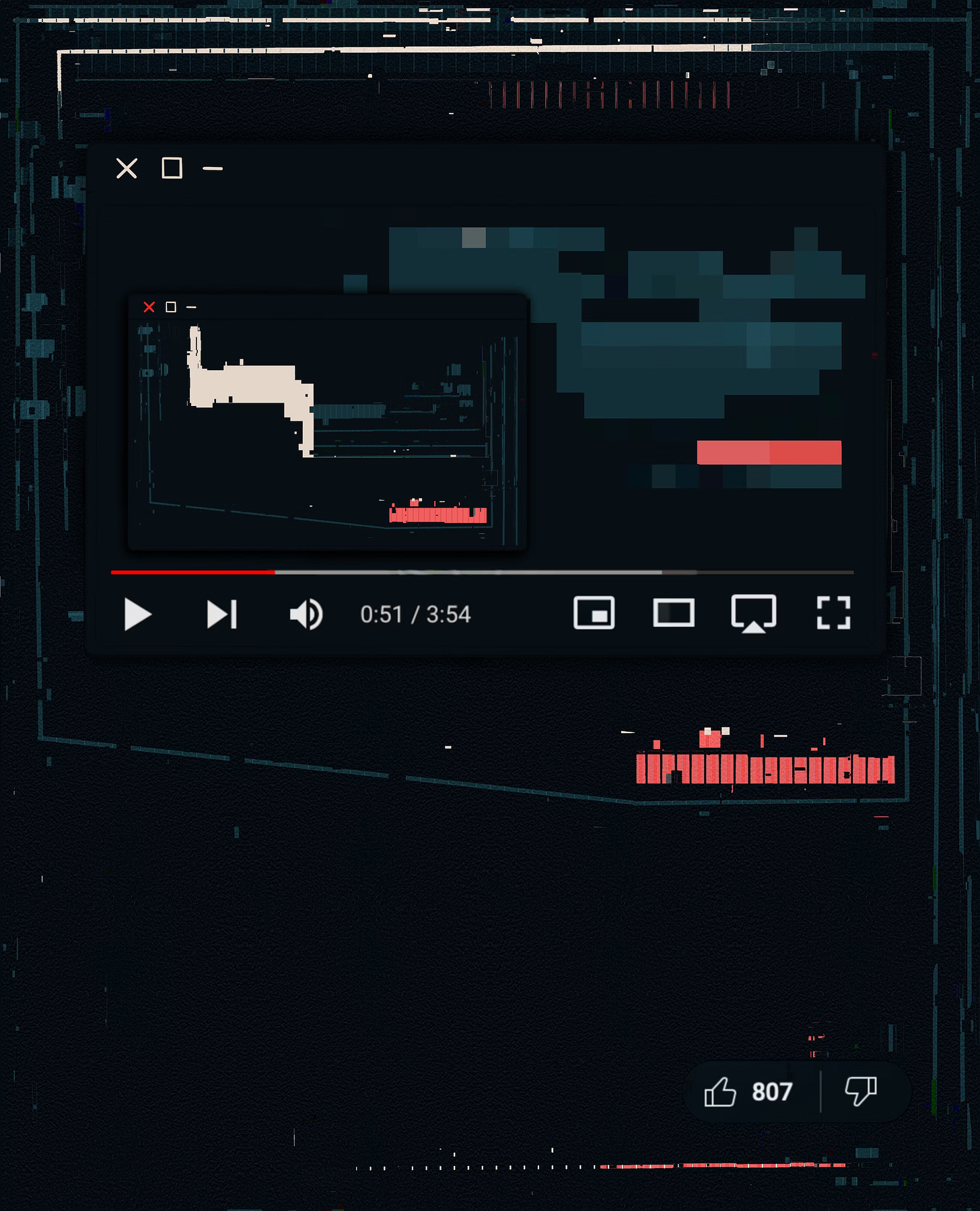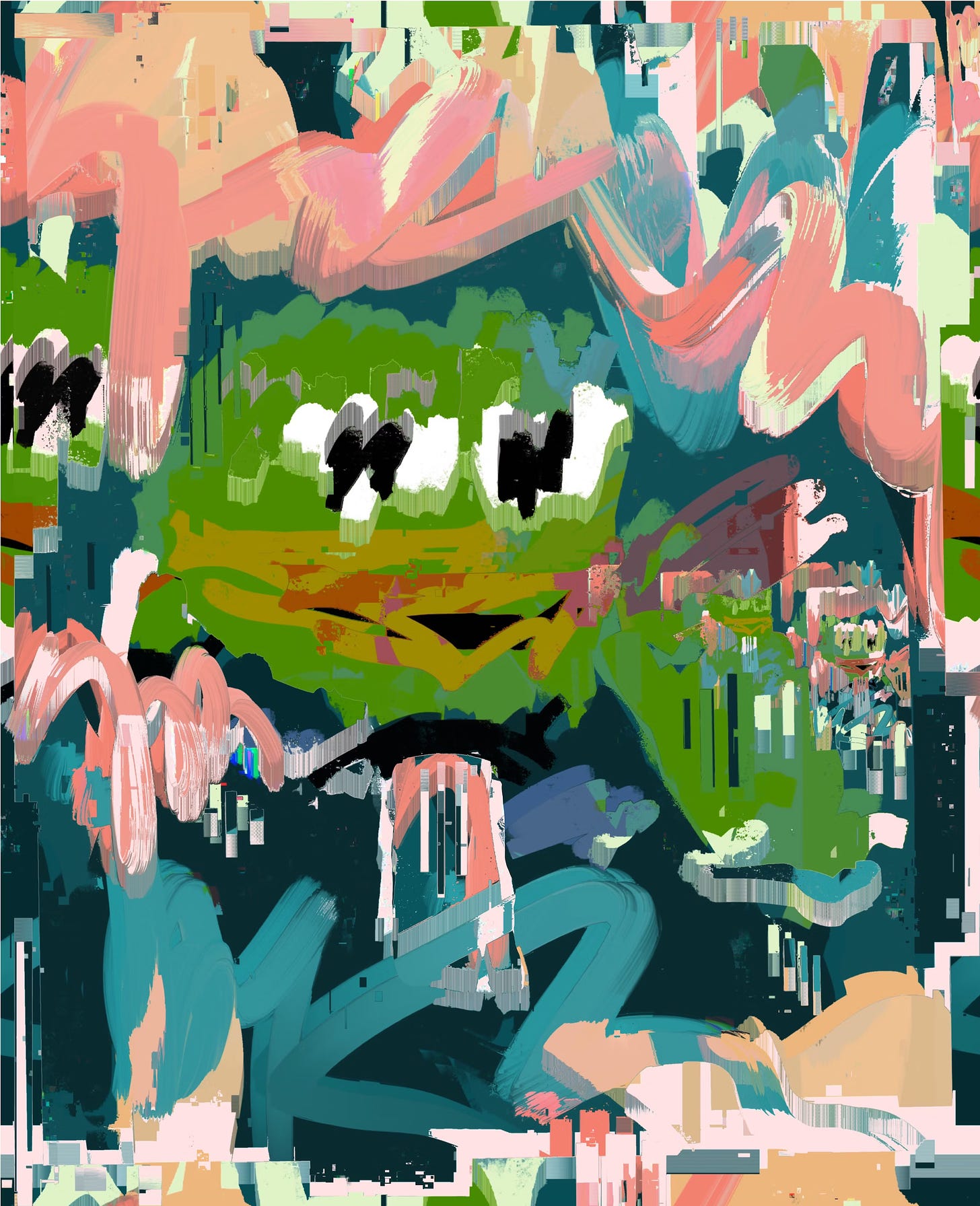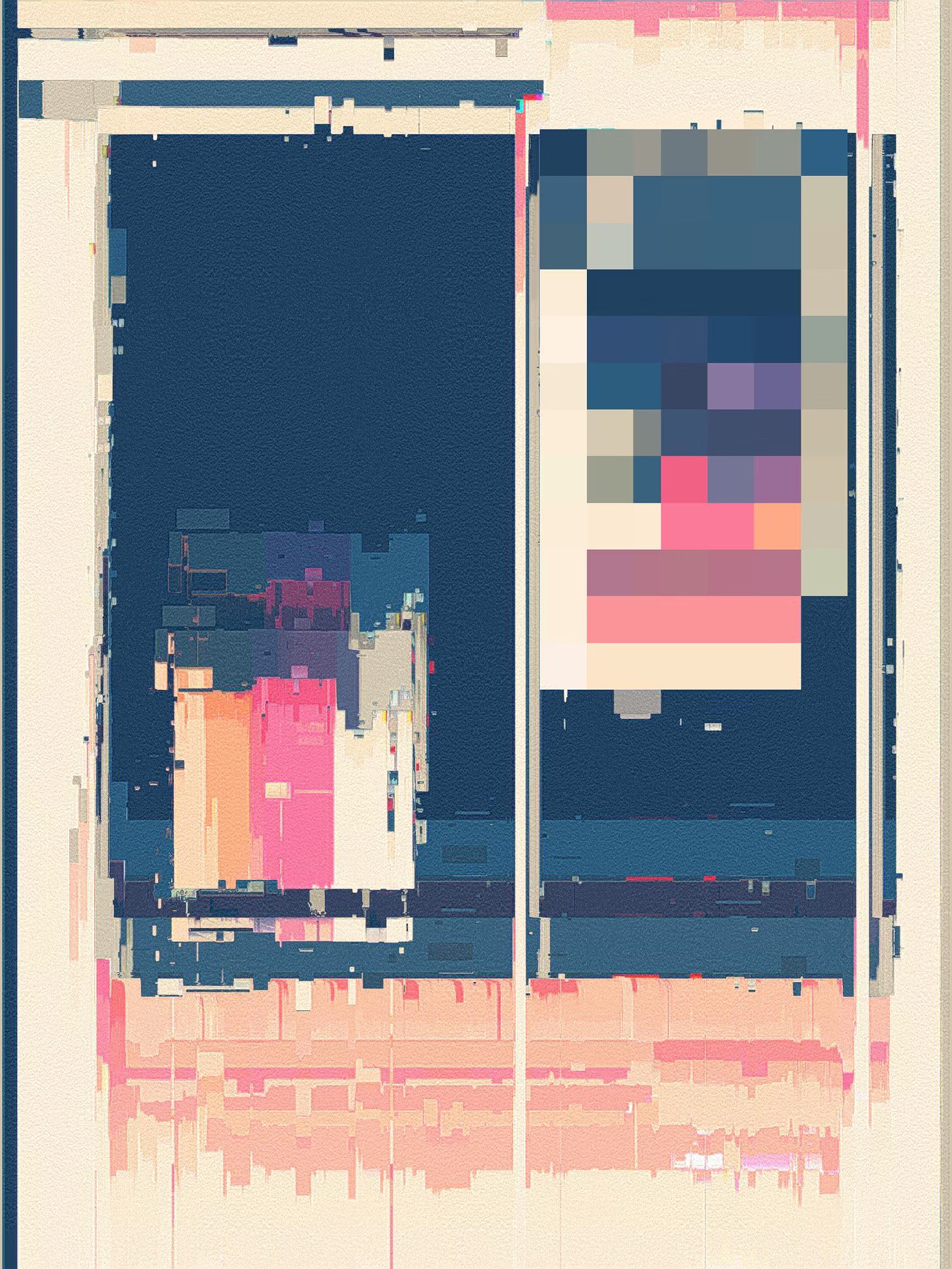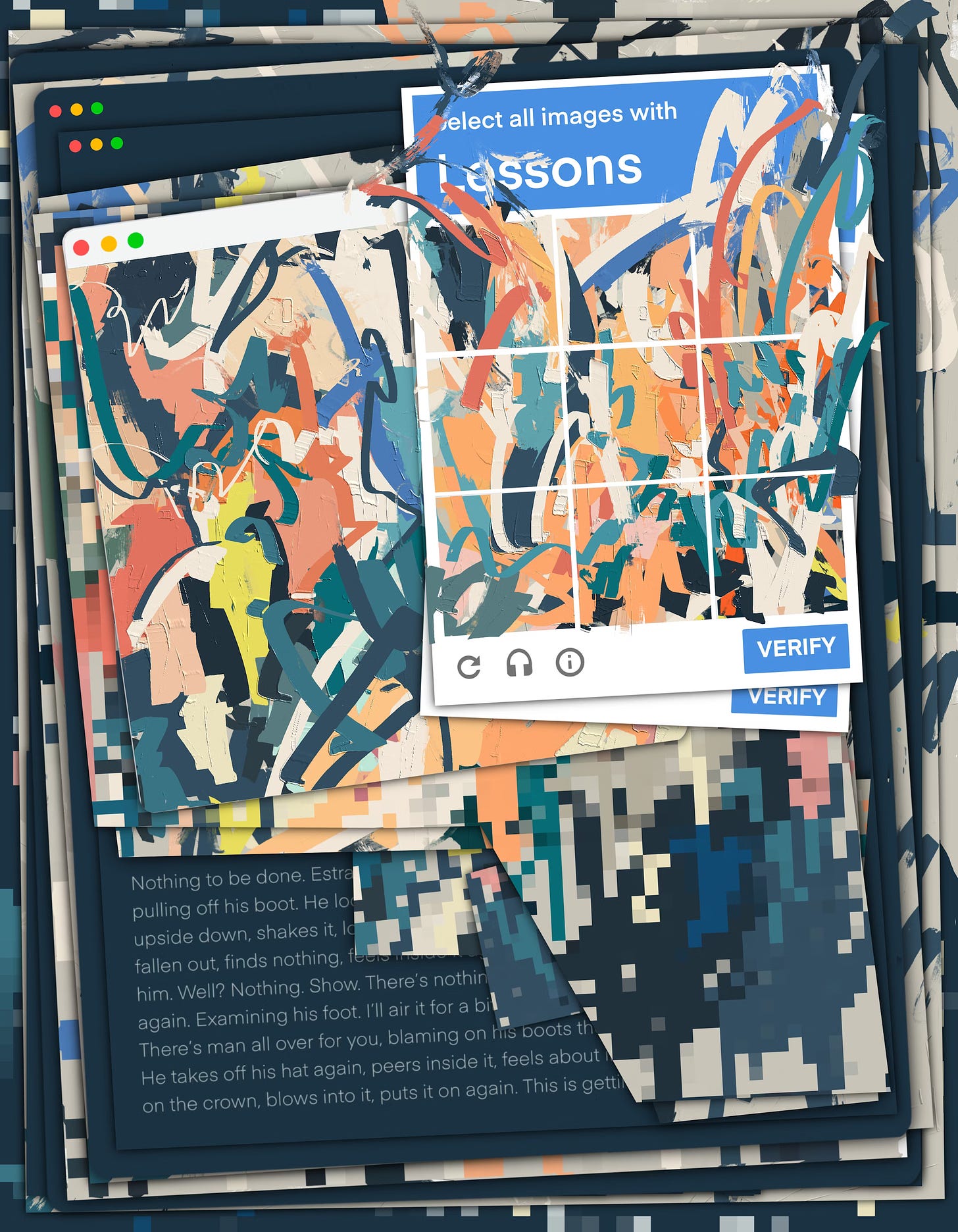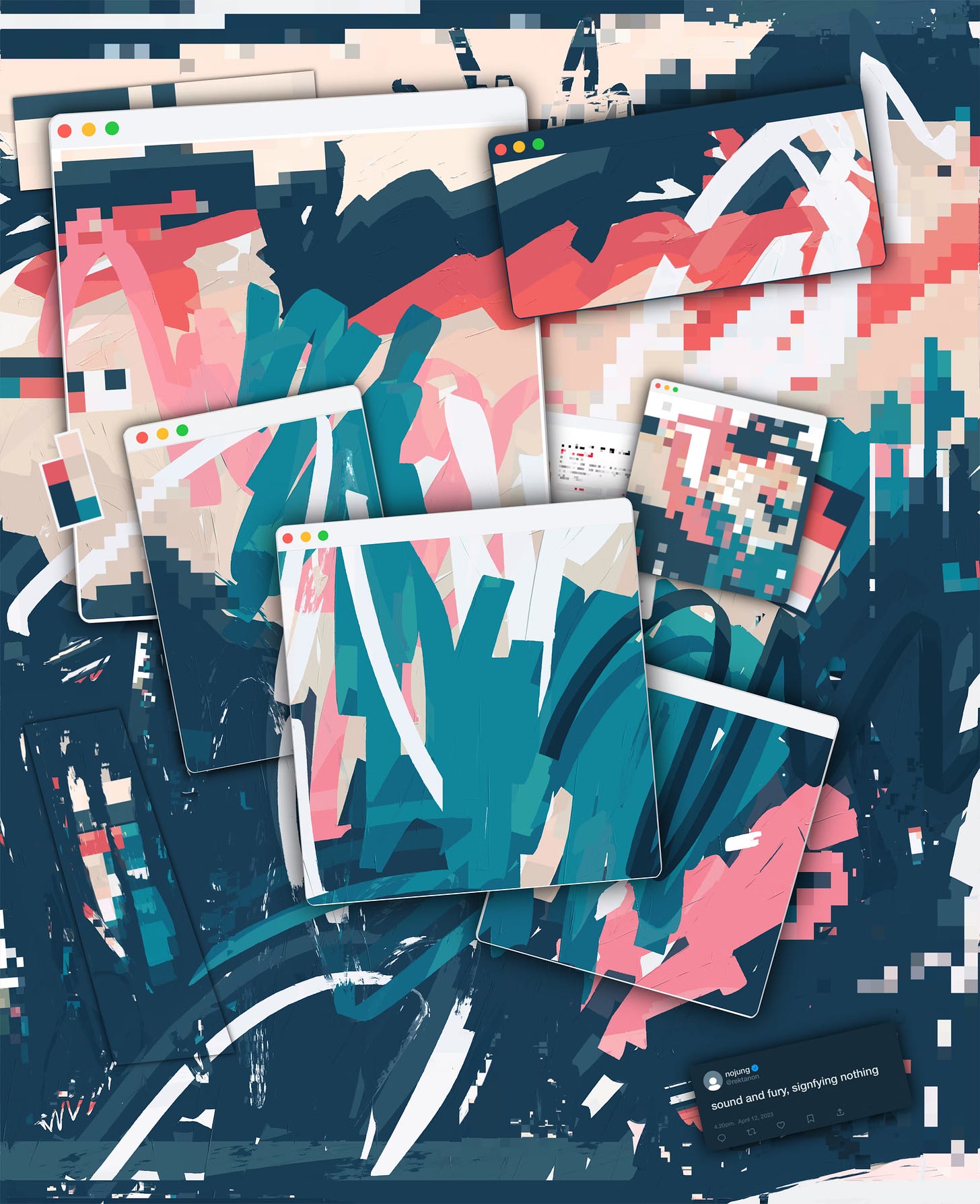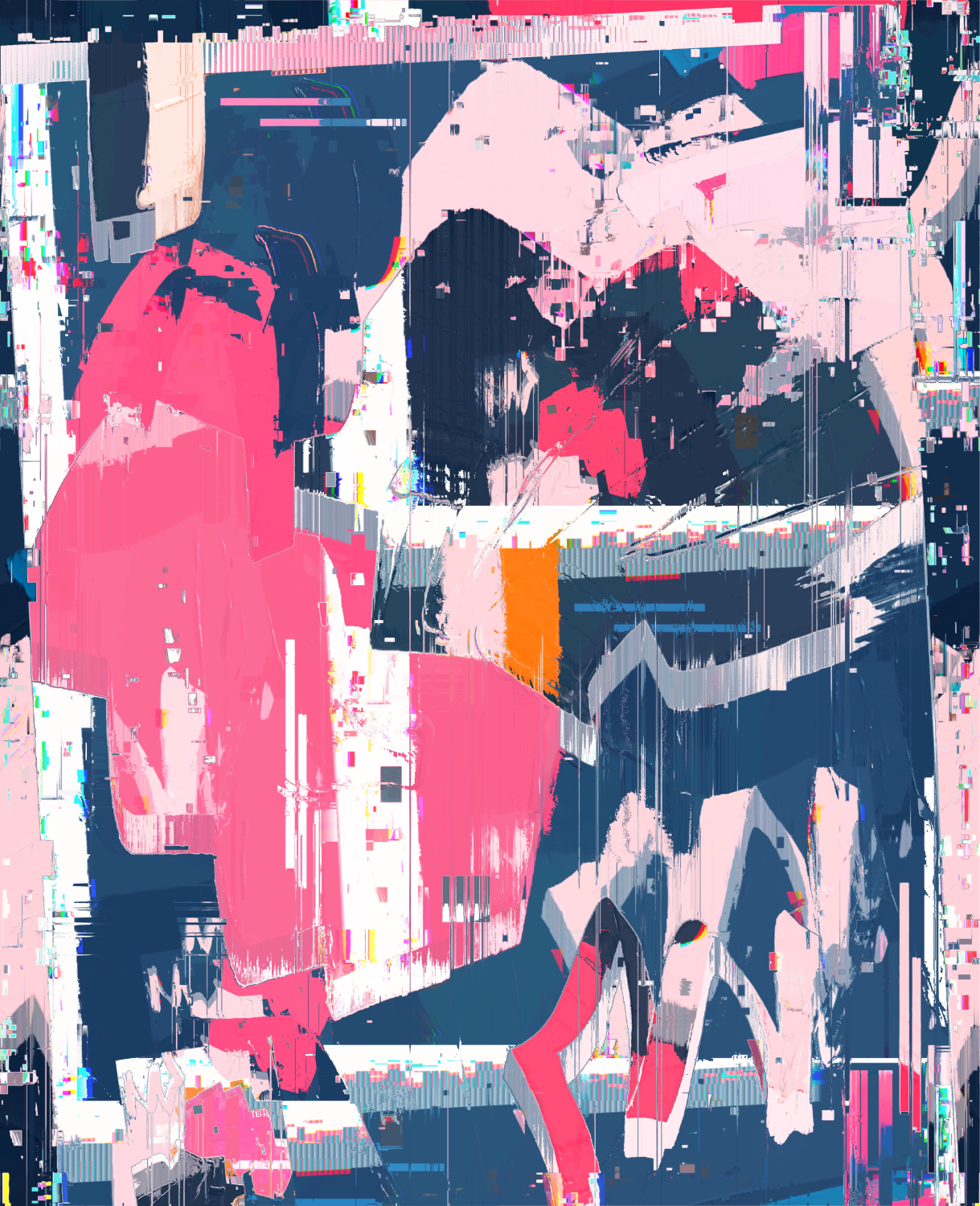Jack Kaido: Abstract Painting, the Power of Repetition & Creativity
"Luck is a component to success for sure. Yet so is commitment. Hard work and dedication help set you up for when luck arrives."
Yo! Welcome to another edition of Behind The Keys!
You cannot miss this one. It’s definitely the most extensive interview I’ve had so far, and it’s absolutely full of gems.
Jack was kind enough to not only answer all questions but to answer them in a way in which I was left staring at the wall for a while thinking about them.
His interview is a little bit longer than usual, but I promise it is 100% worth it.
As always, thank you for reading, and let me know what you think.
Cheers!
Dalos
WhoTF is Jack Kaido?
Jack Kaido is a pseudonymous digital abstract painter whose art explores the abstract image through digitally-native works that aim to reflect their medium and their time.
Emotions, memories, ideas and concepts are weaved with expressionism, minimalism, colour theory and the incorporation of the digital visual language the artist lives and interacts with, such as internet web pages and interfaces, search bars, apps, text, glitches, errors, gradients, composites and pixelation.
Kaido's paintings have been shown worldwide, are owned by some of the world’s foremost crypto art collectors, and have been sold in the most important auction houses of the world, such as Christie’s, citing him as one of the artists at the forefront of digital art today who are influencing the future of the medium.
Behind the Keys: Jack Kaido
What is something you wish someone had told you before becoming an artist?
Strap yourself in.
What does your creating process look like?
As a digital painter, my studio is my bedroom. So I’ll usually put on music and get painting. I collect a lot of source material in folders on my computer and look through them as well as books, in between creating.
The process of making paintings now depends on their nature. Abstract-only can be a largely expressionistic process, which can either feature the fuller execution of quick studies or just be purely explorative and ‘in the moment’ and based on intuition and experience etc. Work such as the Traces is more planned out and methodical, as by its nature it needs to be.
I’ll collect source material, think through placing, etc, and draw a range of what I call ‘assets’. Many of these assets won’t make the final painting, they are drawn and tested in a multi-stage process and I go with what I feel works best. The construction of my art was very much collage/composite-like now, and as I’ve progressed artistically, the process has become more complicated.
Most of my art is created on an iPad on Procreate, but I also use other apps too and switch back and forth — insert, paint, draw, cut, edit, switch over, switch back — rinse and repeat. And because I usually create at Procreate’s largest resolution size (which reduces layer amounts down to four layers), creating a painting can involve many layers across several different files simultaneously, which are then merged at the end for the final image. This sometimes means keeping the full composition in my head as I create, but if wanting to future-proof your art for when much larger display sizes are available and ubiquitous in the future, it’s worth it.
Who are 2-3 artists you admire or respect that you think deserve (even) more recognition?
There are lots of artists I admire and respect who I believe deserve even more recognition, and on various levels too, too many to list. But say, in abstract art history, there are artists like Ethel Schwabacher, Mary Abbot, or Samuel Feinstein.
In crypto art, off the top of my head would be AERTIME, a glitch artist who has been making unique digital art for many years. His art has also been influential to me and others here. Another glitch abstract artist is Chepertom, whose artworks are created with a unique and innovative process and are instantly recognizable as Chepertom’s. There are lots tbh but there are two.
What activity do you fall into when you are trying to enhance your creativity?
Reading is mind fuel. Going to galleries and museums too. Strong coffee, viewing art in books and online, and sometimes just going for a long walk too. Walking through places you haven’t been before, or taking different routes than you normally would, they can have more of a loosening on the mind’s pathways than normal routes. Traveling as well, seeing new places far away, nature, historical sites… that for me is like an injection of ideas.
For whatever reason, I don’t really need to do things to bring about creativity; ideas come naturally and that can be tiring too, but I have noticed those things make them come with more intensity.
What do you benefit the most when working with NFTs and the blockchain?
I’ve been making digital art for around 5 years now and have been in crypto for longer, and quietly dreamed of a world where I could exchange my art in cryptocurrency, so it still hasn’t fully sunk in that this is just normal life now. I’d made digital art for a couple of years before I knew about art NFTs or minted anything, not thinking much about where it could go, but that was never the focus. I was just painting digitals and learning how to use digital tools.
At some point though, after making lots of it, I had some kind of existentialist doom overcome me, like, ‘I’m making all this, where is it going to go? What’s going to happen to it?’ That type of typical artist doomery lol. It swept over me for ages. A little while later, in late 2020, I discovered crypto art. So I’m massively grateful that blockchain has provided a fitting place for my art and that people can appreciate and/or collect it. The convergence has been a dream come true.
I’ve also met some incredible people and formed great friendships with people from all across the world, from just being here. There are some brilliant minds here from whom I’ve learned a lot too.
What skill should anyone harvest early in their career that will pay off massively for years?
Probably habituating whatever it is they want to do through repeated practice, in incremental stages, often. If you make things automatic, it’s simply much easier to do them again in the future, even when you don’t feel like doing the thing.
It’s a certainty that a creative person will go through periods in their life where they are not feeling it in the usual way — and all of the greats had such periods, even Picasso — but the act of returning to the canvas, the blank page, the music studio, the camera, the musical instrument, whatever it is you like doing, just becomes easier if you’ve done it a thousand times before.
What is your favorite failure?
When you fail at doing something creative you set out to do, but in the process discover something different — either by exploration or complete accident — that sticks with you and becomes an attribute of your creations.
What is one thing you think artists should focus more on, and why?
I’d say just making what they love, what speaks to them, and not be concerned about others’ expectations or opinions, or about ‘developing a style’.
If you’re an artist just starting out, don’t worry about developing a style. Do it long enough and that comes. Absorb influences, imitate at will, create create create! Eventually, all your influences and all that you’ve learned from creating and experimenting will fuse together. Soon enough, it will actually become harder for you to create things that don’t look like your art. Yet you always remain free to break out of that whenever you wish to. Contentedness about what you’re creating is far far more important than external validation or any of that.
‘Style’ and distinctiveness are commonly portrayed as the absence of influence, but IMO they occur as the opposite, they are most often the result of an abundance of different influences. An example I gave on Twitter a while back, was along the lines of, “If you sing like Bob Dylan, you sound like Bob Dylan. But if you sing like Bob Dylan, have Caribbean steel drums, Led Zeppelin guitar riffs, and drums like Chase & Status, on top of your own unique ways, you have something different”.
I’ll add another because it’s important. Don’t get jealous of another artist, be that their sales, accomplishments, or anything else. I’ve been on the receiving end of that behaviour a lot and even from people I thought were friends too. Others I know have received it in abundance too. It usually amps up or re-arrives after every sale. There’s not much more disappointing than having a friend who got salty because of something superficial like sales; it can damage trust and ruin relationships. I’ve even had it from people who were doing better than I was, which for a while made no sense to me until I understood this behaviour isn’t just about sales, but also about insecurity and the recipient having something they want.
That doesn’t just have to be money. I’ve been hated on for even simple things like writing about my art, by those who had never put the time and effort in to learn to be able to do it. Tellingly, those same people later started writing about their art. The list of such things goes on. They resent those who can do what they covet. It’s a form of projection Carl Jung wrote about a bit. There are plenty of things I cannot do as well as others. Yet if it’s something I want to achieve, I think, ‘ok, how can I learn that’. Not, ‘I should hate on them for doing it, that will make me feel better’.
So my advice is to just happy for your friends, be happy for other artists you don’t even know, and if you ever feel frustrated because someone is selling or whatever, instead of hating, double down on focusing on yourself and your art and on getting where you want to go. If you can’t do something, rather than hating on someone for the hours of practice they’ve put in to do it, learn how to do it. And if you find yourself dealing with someone who is frequently undermining your milestones or sales or whatever, know that they’re doing it because it’s easier to dunk than to learn, and it’s done out of weakness and insecurity. The same people dunking on others for daring to try something different out are always the ones without the courage to try anything different at all.
Why do you create art?
I need to. I’m haunted by it when I don’t. But it’s also catharsis, it’s enjoyable, expressive, stimulating, thought-provoking, it’s challenging, and now thankfully, it’s my full-time job.
When I had absolutely nothing, I still had art. My life is built around it.
What’s the hardest part of being an artist?
Every artist I’ve met is atypical in some way. In children, we see Aldous Huxley’s ‘reducing valve’ bust wide open, their creativity is boundless, and they have unusual and creative ways of thinking and perceiving. Their brains are taking much information, less is getting filtered out than normal, neurogenesis is happening, new connections are forming at immense rates, and there’s lots of electrical activity happening and traveling across parts of those brains that are more malleable than in adults.
Much of that crosses the fibrous band that connects the two hemispheres — the corpus callosum. It’s believed that the larger and more fibrous this band is, the more information and activity cross over, which can lead to more abstracted, creative, and divergent thought, because two separate parts of the mind that wouldn’t normally connect with each other, now are. Along with other things, Einstein’s autopsy revealed him to have an abnormally large corpus callosum, and it checks out because he was capable of visualizing and connecting seemingly disparate things together like few else.
In creative adults, some of this restless creativity and reduced filtering remains in adulthood, so creativity of the type of a lifetime pursuit through into adulthood is in essence a by-product of something else, a symptom of sorts. This means many minds that are divergent, have hyperactive imaginations, are subject to associative thinking, reverie, attention deficits, overthinking and atypical thought, and more. Of course, that’s not all bad, but it can affect the individual in a range of ways: sleep, thought, anxiety, attention, neuroticism, stress, impulsivity, mood, etc, whatever it is that each individual encounters.
The rates of psychological issues among artists (and creatives in all mediums) are higher when compared to the general population. That also means creative minds are more subject to things like depression, disassociation, anhedonia, nihilism, ADHD, schizophrenia, bipolar, hypergraphia, obsessive-compulsive behaviour, autistic-like behaviour, suicide, addictions… the list goes on. The history of art is littered with examples of this, and all artists I’ve ever met are atypical in some capacity.
For example, in my own case, I often get disrupted sleep, I can be hermetic and every now and then I can be a halfwit. I recently was with someone here who I respect, I had things I wanted to talk about and went about matters the completely wrong way: a prime example of atypical behaviour that can temporarily consume an individual and see them deviate from their baseline. Fortunately, the recipient knows most artists are weirdos, took it like a champ, and was understanding about it. I’ve also been on the receiving end of some weird atypical behaviour too from artists here and I always try to be patient about it.
We artists just have to be self-aware, learn where we go wrong, and learn to understand ourselves better so we try to master our minds and not let any atypical behaviour negatively impact others. That goes for all types of people, not just artists; we all have aspects we need to improve upon. Artists are just more likely to be susceptible to being irrational from time to time. I’m a lot less wary of those who make mistakes but know they are flawed than those who use others’ flaws as weapons as if they don’t have any of their own.
What’s a book or an article that has greatly influenced your life?
There’s been many and in different ways. It’s too difficult to whittle them down to one without doing some disservice to the impact of the others. I’ll try… Exposure to art books when young was a huge influence, as was reading about the universe later, the writings of Samuel Beckett, Albert Camus, George Orwell, Richard Dawkins, the Stoics, and books on cognitive processes. Nietzsche too, even though I had no clue what he was saying 70% of the time, that other 30% was valuable.
What habit or practice has changed your life the most?
Maybe an unusual one here, but nearly dying. I’ve come very close to dying before, and have luck to thank for still being here, and after it, you see everything completely different. Like, on a basic level, you can get grouchy or annoyed about things in your life, things that happen to you… everyone is susceptible to that. We’re just human. We might have moments where things build up or spill out, stress consumes us or we ain’t ourselves.
But after that, on a deeper level, little really fazes you. It naturally installs a cognitive habit where it’s easier than before to be reminded of what really matters, and when facing difficulty, you default back and cognitively strip things back down to those things. There’s only a handful of things that are important enough to truly matter: the health and happiness of our family, ourselves and our friends; our safety, our focus, and making the most of the time we all have with whatever we love doing. We all get irritated or wound up, and we all have our moments, but ultimately it means nothing and it’s also temporary. I obviously don’t advocate coming close to death, it’s just been influential in my life.
I also read a lot about the universe and whenever I do, I’m left with both wonder and just laugh about things tbh. I should actually do it every morning when waking up, as a daily reminder. There’s a black hole out there so large you could fit 11 of our solar systems just within its event horizon, the rest of it is even more astonishingly huge. There’s also a void out there that the fastest thing we know — light — still takes 330 million years just to go across once, and here I am, a not-so-evolved ape on a tiny rock hurtling through an endless vacuum of nothingness and I’m getting stressed about some trivial but oh-so-very-serious-to-me ape thing.
If you could ask yourself one question every day to set yourself up for success, which one would it be?
‘Jack, how are you going to make the most of today?’.
What does success look like to you?
The upper echelons of success, for me, are things like being a good parent, giving time to your children and making sure they are well looked after. I don’t think there’s anything more successful than a good parent. Also, if you build time in your day for the things you love doing, even if a small amount of time, then in my book, you’re already successful. Life is short, and even if you haven’t ‘made it’ in whatever career you want to do, you’re still devoting quality time every day to what you love doing. On your deathbed, irrespective of a career, you will have wanted to have at least enjoyed living it as much as possible.
An extension of that would be self-actualisation and being able to wake up every day and only doing what you want. You sometimes see people say, ‘money isn’t important’, but I view it as important, but predominantly because it allows you to eat, feel secure and to wake up and devote all of your time to pursuing whatever you want. As an artist, the more time you have, the more time you have to create. Money is obviously not a panacea; it doesn’t solve some things, but it does allow you even more time to create, which in turns make you improve, and more time to reflect and read without the time and life constraints that come with a ‘normal’ job.
Obviously, like any artist, I love when my work is sold, new ATHs, being in exhibitions etc, all of that stuff, but having art shown next to those painters I studied when learning to paint, that’s probably the highest form of ‘career’ success I can think of, other than conveying what I sought to convey and pushing myself for the whole of my life.
What are you willing to struggle for?
Well, in reference to the individual, there are two strands I guess. There is the technically more superficial; sales, success, recognition, legacy, innovation — all of these an artist ‘struggles’ for and works towards, and it has meaning and a valid place for sure, but some of it also subconsciously serves to sate the human ego too. On humanity’s timeframe, innovation or legacy can be everything to an artist. But on the universe’s timeframe, humanity’s entire existence is like a single raindrop in billions of oceans, as is our own size within the universe, so legacy is ultimately just a more elaborate and skilfully-designed construct of the mind, to sate the ego and the individual’s apparent significance amongst an infinite sea of insignificance. It’s a dichotomy for sure. That said, we can choose to give our own meaning to our lives and I’m not knocking that, it’s important. I’ll certainly work hard for my own I’ve formulated. It’s just a contradiction of being human and of being an artist.
The second strand would be the things that affect there here and now of the individual: contentedness, accepting who you are, your flaws and misgivings as well as your qualities, your physical needs & safety met. From the experience of having absolutely nothing, skipping days of eating just to pay rent, to now, I believe Maslow’s Hierarchy of Needs is accurate and some of the first above are woven in with the second strand.
Beyond the individual, there are things like uplifting others or doing things that help someone else who needs it more, in some way. I’m not on some grand plan to ‘save everyone’ though or anything like that, I just do what I can with what time and energy I have.
What is one strong opinion you have?
That, say, some young kid from a ‘developing’ nation can have their life changed and their art collected en masse by just having an internet connection, a Twitter account, and a love for making art, is massive, revolutionary, and much-needed. No art school qualifications, or anyone telling them what art is or can be. I cannot stress enough how seismic is the democratizing shift that crypto art offers, and can have in the future, and that’s a great thing.
This said, there is this hostility towards art history occasionally espoused by prominent voices in our space that bizarrely seeks to undermine the significance of it or the major institutions themselves. What often gets conflated — because of how haughty the trad art world can be — is knowledge, conflated with gatekeeping and elitism.
You don’t need to possess a lot of knowledge about art to appreciate art, but also, you don’t need to be elitist to possess a lot of knowledge about art. It’s like anything else, more knowledge about the subject simply means a richer and deeper appreciation of the subject. And art books are free from libraries.
I knew nothing about fine dining, and still don’t tbh, but after I once went to a fine-dining restaurant, I realized that there are major major levels to food. Some take it way more seriously, they study the chefs of previous (and often, study under them), they spend their entire lives studying food and combinations, they study the precise chemistries of taste and flavour itself. They are culinary masters. My appreciation of food itself became richer. I still enjoy and eat burgers and everything else exactly the same as before, all that changed is my knowledge and appreciation expanded and increased. Art is no different.
So clearly put, if we are wilfully ignorant to the history of art, we inadvertently condemn ourselves, collectively. Art is a giant interweaving web of various time periods, styles, means, and subjects of expression. It’s also a dynamic entity, with time periods entering, influencing, and leaving any given artist making art, at any given moment. Every artist you’ve ever seen has been influenced by at least one other artist. Go and ask Scorsese if the history of cinema is important to him, or Eminem, about the history of rap, or Joni Mitchell or Bob Dylan, about the history of music. It’s shaped and informed what they’ve made.
So it’s harmful and counterproductive to the overarching long-term strength of art itself, never mind our own space, to actively create some kind of schism between what’s came before, and what’s being made now, and carve our part off to operate only in a tiny myopic island of its own. Think of the whole ‘positioning art institutions like MoMa as the enemy’ type thing, “don’t let the institutions steal our JPGs”.
Such a mantra also loses its validity if you simultaneously say things like that, and then actually donate jpgs to institutions or celebrate when that occurs. For the record, I’m not against donating jpgs to institutions, I support it; places like MoMa host some of the greatest art in human history and why shouldn’t a Fidenza be on display alongside a Kandinsky etc?
We’ve also got some similar behaviours in our space, as exists in trad art, that need to be corrected if we want to advance in a healthier direction. Many speak about them privately but are afraid to talk about them publicly out of fear of consequences, but I’m not. I'll give my honest answer to anything, I very much view it as 'if someone didn't collect my art because of my view on X or Y, why would I want them collecting my art in the first place?' I'm not changing who I am just to catch a bag.
In short though, to achieve the cementation of digital art and crypto art as legitimate art forms akin to all the others, we have to take the best from both worlds, our world and trad art, and strip out the bad from both too — there’s plenty work for us to do, for our own. ‘Number go up’ simply isn’t enough. Knowledge and education are very good things.
Which of your past experiences/learnings have set you up for success in the present?
People might view me as successful because of the sales etc, and I understand that, but in many ways, I don’t view myself as ‘successful’ because I’m still learning, still experimenting, still growing, still discovering new things about colour, composition, and art overall. Painting and learning are lifelong things and success imo is largely tied in with being able to do what I set out to do, convey what I wanted to convey and push myself and my art. There’s a whole lot more ahead and whenever you learn new things, you sure don’t feel successful, you feel like a beginner in that new aspect you’re trying to implement and get right. Maybe I’ll feel different in decades but despite being ‘experienced’, I’m still at the beginning of my career. I have much room for growth in many ways. Over the years it does get easier — the more you create, the more you find creating easier to do and your failure rate goes down between bad paintings and paintings you believe are strong — but whenever I start finding something easy, that’s usually my signal to make things hard for myself again.
But answering your question directly and what happened to lead up to now, I figure my ‘success’ is an assimilation of many things. Many years of commitment to learning and creating; a willingness to take risks and evolve and switch up; throwing everything I have into trying to make it a career, and a big dose of luck and my work having been noticed at the right time. Luck is a component to success for sure. Yet so is commitment. Hard work and dedication help set you up for when luck arrives. There were many years where I just painted without anyone seeing them, without any sales at all, I learned invaluable things during that period by just painting, and I also came into the crypto art space not knowing anyone. I started from zero and threw everything into it that I have. Some things paid off and I got lucky at several points as well. And I got lucky early on here and then only a few months later, few were interested. Then I went and made Errors. You just have to keep at it and throw everything you have into it. We are in it for life.
What would you say to your 25-year-old self?
Get painting.
Learn more from Jack
Something to read: Abstract Art: Past, Present, Future by Jack Kaido (MUST READ!!!)
Get in Touch with Jack
The best way to get in touch with Jack is via Twitter or his website.

